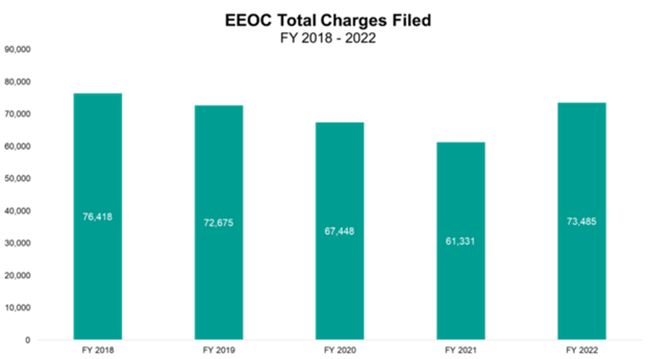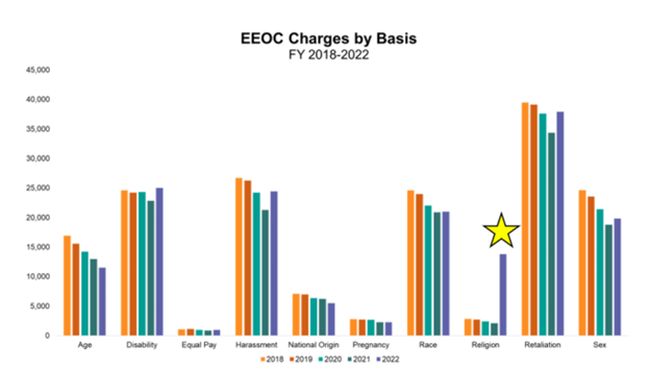Seyfarth Synopsis: Each Fiscal Year ("FY"), the Equal Employment Opportunity Commission ("EEOC") releases data on the number of charges it receives from applicants and employees. This data is noteworthy as it reflects the experiences of the American workforce and how individuals feel they have been treated over the past year. In FY 2022, the EEOC saw the number of charges leap by more than 10,000 over the prior year. This uptick appears to be almost entirely attributable to the COVID-19 pandemic: a striking rise of over 600% in religious discrimination claims, with many filed by applicants and employees seeking religious exemptions to companies' COVID-19 vaccine mandates.
Breakdown of FY 2022 EEOC Charge Data
In order to file a lawsuit under federal workplace anti-discrimination law, an employee must first file an administrative charge with the EEOC. Given that an EEOC charge is the first step to filing a federal discrimination case, examining the EEOC's charge data can provide an interesting perspective on the status of the employment discrimination space. Indeed, EEOC charges are a direct reflection of employees' views about how they are being treated in the workplace.
Since FY 2018, there has been a steady decline in the amount of total EEOC charges filed. Specifically, American workers filed 76,418 charges in FY 2018. This number dipped under 73,000 in FY 2019 and has since continued to decline, culminating in a historic low of 61,331 charges filed in FY 2021: the lowest total filing number since the EEOC started to publicly track filing data in 1992.
The EEOC's announcement of FY 2022 data shows that trend has reversed. American workers filed a total of 73,485 charges with the Commission last year, an increase of approximately 12,000 charges as compared to FY 2021, and the highest amount of charges filed since FY 2018. The graphic below shows how FY 2022 reversed the downward trend observed since FY 2018.

In addition to publishing the amount of total charge filings per FY, the EEOC also reports on the annual number of charges alleging various types of claims. For instance, the most common category has historically been retaliation, which accounts for between 35-55% of total filings per year. (Charges can include more than one type of claim, and retaliation claims are often made in addition to claims of discrimination, harassment, or failure to accommodate.) Interestingly, most FY 2022 filing numbers per category are not significantly different from those in FY 2021. Though the number of charges alleging retaliation, sex discrimination, and disability discrimination ticked moderately higher than the prior FY, filing numbers for age, race, and national origin discrimination claims slid downward as compared to FY 2021.
Claims of religious discrimination are the driving force behind the overall increase in EEOC charge filings from FY 2021 to FY 2022. In FY 2021, American workers filed 2,111 charges alleging religious discrimination, but in FY 2022 the EEOC recorded a whopping 13,814 religion-based charges. This nearly seven-fold increase in religious discrimination charges is no coincidence – it is fueled by the flood of employees who sought religious exemptions to COVID-19 vaccine mandates implemented by many employers in FY 2022. Even the EEOC's own charge statistics page notes that "[i]n FY 2022, there was a significant increase in vaccine-related charges filed on the basis of religion." The graphic below highlights the amount of EEOC charges filed by type of claim between FY 2018 and FY 2022.

Significance of EEOC Charge Data for Employers
EEOC charge data provides a unique window into activity at the Commission, and it also instructs employers on how American workers as a whole claim they have been treated in the workplace. While vaccine mandates are not as common now as during the height of the pandemic, the EEOC's FY 2022 charge data suggests that employers may be grappling with the ramifications for some time to come, as EEOC investigations continue and some charges take on a second life in courthouses around the country. Stay tuned to our blog as we continue to monitor the EEOC's activity, the legal implications of the COVID-19 pandemic, and the overall status of the workplace discrimination space.
The content of this article is intended to provide a general guide to the subject matter. Specialist advice should be sought about your specific circumstances.
We operate a free-to-view policy, asking only that you register in order to read all of our content. Please login or register to view the rest of this article.



